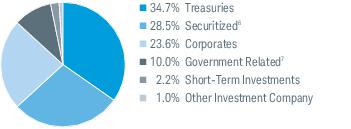2. Significant Accounting Policies (continued):
(c) Security Transactions:
Security transactions are recorded as of the date the order to buy or sell the security is executed. Realized gains or losses from security transactions are based on the identified costs of the securities involved. Gains and losses from paydowns on mortgage and asset backed securities are recorded as adjustments to interest income.
(d) Investment Income:
Interest income is recorded as it accrues. If a fund buys a debt security at a discount (less than face value) or a premium (more than face value), it amortizes premiums and accretes discounts from the purchase settlement date up to maturity. The fund then increases (in the case of discounts) or reduces (in the case of premiums) the income it records from the security. If the security is callable (meaning that the issuer has the option to pay it off before its maturity date), then the fund amortizes the premium and accretes discounts to the security's call date and price, rather than the maturity date and price.
(e) Expenses:
Pursuant to the Investment Advisory Agreement (Advisory Agreement) between Charles Schwab Investment Management, Inc. (CSIM or the investment adviser) and the trust, the investment adviser will pay the operating expenses of each fund, excluding interest expense, taxes, any brokerage expenses, and extraordinary or non-routine expenses. Taxes, any brokerage expenses and extraordinary or non-routine expenses that are specific to a fund are charged directly to the fund. Effective March 1, 2017, the Advisory Agreement was amended to include interest expenses, which were previously excluded.
(f) U.S. Treasury, Agency Debt & Agency Mortgage-Backed Securities Charges:
Due to market conditions or other reasons, delivery of U.S. Treasury securities, agency debt and agency mortgage-backed securities may not occur on a timely basis. In these instances, a fund may fail to receive a security purchased causing the fund to be unable to deliver a security sold. The TMPG recommends voluntary fail charges when securities are not delivered as agreed by the parties. These fails charges are included in net realized gains (losses) on each fund's Statement of Operations, if any.
(g) Distributions to Shareholders:
The funds make distributions from net investment income, if any, monthly and from net realized capital gains, if any, once a year.
(h) Accounting Estimates:
The accounting policies described in this report conform to GAAP. Notwithstanding this, shareholders should understand that in order to follow these principles, fund management has to make estimates and assumptions that affect the information reported in the financial statements. It’s possible that once the results are known, they may turn out to be different from these estimates and these differences may be material.
(i) Federal Income Taxes:
The funds intend to meet federal income and excise tax requirements for regulated investment companies under subchapter M of the Internal Revenue Code, as amended. Accordingly, the funds distribute substantially all of their net investment income and net realized capital gains, if any, to their respective shareholders each year. As long as a fund meets the tax requirements, it is not required to pay federal income tax.
(j) Indemnification:
Under the funds’ organizational documents, the officers and trustees are indemnified against certain liabilities arising out of the performance of their duties to the funds. In addition, in the normal course of business the funds enter into contracts with their vendors and others that provide general indemnifications. The funds’ maximum exposure under these arrangements is unknown as this would involve future claims that may be made against the funds. However, based on experience, the funds expect the risk of loss attributable to these arrangements to be remote.
3. Risk Factors:
Investing in the funds may involve certain risks, as discussed in the funds’ prospectus, including, but not limited to, those described below. Any of these risks could cause an investor to lose money.












